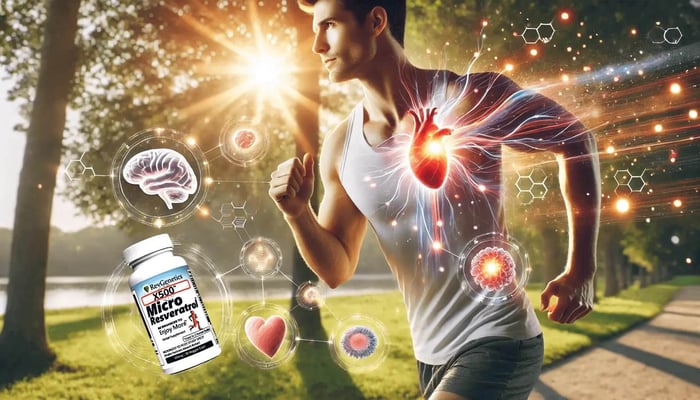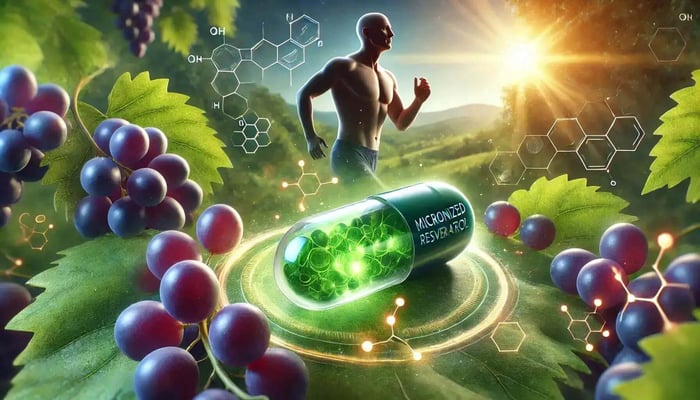The Science Behind Resveratrol: How This Compound Works to Boost Your Health
Understanding the science behind resveratrol reveals why this remarkable polyphenol compound has captured the attention of researchers, health enthusiasts, and longevity experts worldwide. Found naturally in grape skins, berries, and other plants, resveratrol works through sophisticated molecular mechanisms to protect your cells, combat aging, and support optimal health at the most fundamental level.
The fascinating journey of resveratrol from a simple plant defense compound to a cutting-edge health optimization tool demonstrates the power of nature-based solutions for human wellness. By exploring how resveratrol functions at the cellular level, we can better appreciate its potential to transform your health journey and unlock new possibilities for vitality and longevity.

Understanding Resveratrol: The Foundation of Natural Health Enhancement
Resveratrol represents one of nature's most sophisticated defense mechanisms, originally evolved by plants to protect against environmental stressors, infections, and damage. This natural polyphenol belongs to a class of compounds called stilbenes, which demonstrate remarkable biological activity and therapeutic potential when consumed by humans.
The compound exists primarily in two forms: cis-resveratrol and trans-resveratrol, with trans-resveratrol showing superior biological activity and stability. This distinction becomes crucial when understanding how resveratrol works to boost your health, as the molecular structure directly influences its effectiveness in human physiology.
Natural Sources and Bioavailability
While red wine gained fame as a resveratrol source due to the "French Paradox" observation, numerous natural sources contain this powerful compound. Grape skins provide the highest concentrations, particularly in varieties grown in challenging climates where plants produce more defensive compounds.
Other significant sources include:
- Dark berries - Blueberries, cranberries, and mulberries
- Peanuts - Especially the red papery skin
- Japanese knotweed - A traditional medicinal plant with high resveratrol content
- Cocoa and dark chocolate - Containing smaller but meaningful amounts
However, the bioavailability of resveratrol from natural sources varies significantly, and understanding these differences helps explain why targeted supplementation often proves more effective for achieving therapeutic benefits.
The Molecular Mechanisms: How Resveratrol Works at the Cellular Level
The science behind resveratrol reveals multiple pathways through which this compound exerts its health-boosting effects. These mechanisms work synergistically to create comprehensive cellular protection and optimization.
Sirtuin Activation: The Longevity Pathway
One of the most significant discoveries in resveratrol research is its ability to activate sirtuins, particularly SIRT1, often called "longevity genes." These proteins regulate cellular metabolism, DNA repair, and stress resistance, making them crucial for healthy aging and disease prevention.
When resveratrol activates SIRT1, it triggers a cascade of beneficial effects:
- Enhanced mitochondrial biogenesis and function
- Improved DNA repair mechanisms
- Optimized cellular energy production
- Increased stress resistance and adaptation
This sirtuin activation helps explain why resveratrol demonstrates such broad-spectrum health benefits, from cardiovascular protection to cognitive enhancement.
Antioxidant Defense and Free Radical Neutralization
Resveratrol's antioxidant properties extend beyond simple free radical scavenging. The compound works through multiple mechanisms to protect cells from oxidative damage:
Direct antioxidant activity involves neutralizing reactive oxygen species (ROS) that can damage cellular components including DNA, proteins, and lipids. This protective effect helps prevent the accumulation of oxidative damage that contributes to aging and disease.
Indirect antioxidant enhancement occurs through resveratrol's ability to upregulate the body's natural antioxidant systems, including superoxide dismutase, catalase, and glutathione peroxidase. This amplification of endogenous antioxidant defenses provides long-lasting cellular protection.
Anti-Inflammatory Signaling
Chronic inflammation underlies many age-related diseases, and resveratrol demonstrates powerful anti-inflammatory effects through multiple pathways. The compound inhibits key inflammatory mediators including NF-κB, cyclooxygenase-2 (COX-2), and various pro-inflammatory cytokines.
This anti-inflammatory action helps protect against conditions such as cardiovascular disease, arthritis, neurodegenerative disorders, and metabolic dysfunction. By modulating inflammatory responses, resveratrol supports the body's natural healing processes while preventing excessive inflammation that can damage healthy tissues.
Cardiovascular Health: Resveratrol's Heart-Protective Mechanisms
The cardiovascular benefits of resveratrol demonstrate some of the most compelling evidence for its health-boosting properties. Research reveals multiple mechanisms through which resveratrol supports heart health and circulatory function.
Endothelial Function Enhancement
Resveratrol improves endothelial function by enhancing nitric oxide (NO) production and bioavailability. This vasodilation effect helps maintain healthy blood pressure, improves circulation, and supports optimal cardiovascular function.
The compound also protects the delicate endothelial lining of blood vessels from damage caused by oxidative stress and inflammation, helping prevent the development of atherosclerosis and other cardiovascular conditions.
Lipid Profile Optimization
Clinical studies demonstrate resveratrol's ability to improve cholesterol profiles by:
- Reducing LDL (bad) cholesterol oxidation
- Increasing HDL (good) cholesterol levels
- Improving triglyceride metabolism
- Supporting healthy lipid ratios
These lipid improvements contribute to reduced cardiovascular disease risk and better overall metabolic health.
Platelet Function and Blood Clotting
Resveratrol helps maintain healthy platelet function and blood clotting mechanisms, reducing the risk of inappropriate clot formation while preserving normal hemostatic function. This balanced approach to blood clotting supports cardiovascular health without increasing bleeding risk.
Cognitive Enhancement and Neuroprotection
The science behind resveratrol's cognitive benefits reveals multiple pathways through which this compound supports brain health and mental performance.
Cerebral Blood Flow Improvement
Resveratrol enhances cerebral blood flow by improving blood vessel function in the brain. This increased circulation delivers more oxygen and nutrients to brain cells while facilitating the removal of metabolic waste products.
Enhanced cerebral circulation supports cognitive function, memory formation, and overall brain health, particularly important as we age and natural circulation tends to decline.
Neuroplasticity and Brain Cell Protection
Research shows that resveratrol supports neuroplasticity, the brain's ability to form new neural connections and adapt to changing demands. This enhancement of brain plasticity supports learning, memory, and cognitive flexibility throughout life.
The compound also protects neurons from various forms of damage, including oxidative stress, inflammation, and excitotoxicity. This neuroprotective effect helps preserve cognitive function and may reduce the risk of neurodegenerative diseases.
Neurotransmitter Support
Resveratrol influences neurotransmitter systems in ways that support mood, cognition, and overall brain function. The compound helps maintain optimal levels of key neurotransmitters while protecting against age-related decline in neurotransmitter production and function.
Metabolic Health and Weight Management
The metabolic benefits of resveratrol demonstrate its potential as a comprehensive health optimization tool that extends beyond traditional antioxidant effects.
Insulin Sensitivity Enhancement
Resveratrol improves insulin sensitivity through multiple mechanisms, including enhanced glucose uptake by muscle cells and improved insulin signaling pathways. This improvement in glucose metabolism helps maintain healthy blood sugar levels and reduces diabetes risk.
The compound also supports pancreatic beta cell function, helping preserve the body's natural insulin production capacity over time.
Mitochondrial Function Optimization
Perhaps one of the most important aspects of resveratrol's metabolic benefits is its ability to enhance mitochondrial function. These cellular powerhouses are responsible for energy production, and their optimization has far-reaching effects on overall health and vitality.
Resveratrol promotes mitochondrial biogenesis, creating new mitochondria while improving the efficiency of existing ones. This enhancement of cellular energy production supports physical performance, mental clarity, and overall vitality.
Fat Metabolism and Body Composition
Research indicates that resveratrol can influence fat metabolism in beneficial ways, including enhanced fat oxidation and improved body composition. These effects support healthy weight management and metabolic function.
The compound also appears to influence adipose tissue function, promoting healthier fat storage patterns and reducing inflammation in fat tissue that can contribute to metabolic dysfunction.
Cancer Prevention and Cellular Protection
The anti-cancer properties of resveratrol represent some of the most exciting areas of current research, revealing multiple mechanisms through which this compound may help prevent and fight cancer.
Cell Cycle Regulation
Resveratrol influences cell cycle progression, helping ensure that damaged cells are repaired or eliminated rather than becoming cancerous. This regulation of cellular division supports healthy tissue maintenance while preventing malignant transformation.
Apoptosis Induction
The compound can induce apoptosis (programmed cell death) in cancer cells while protecting healthy cells from inappropriate death signals. This selective effect helps eliminate potentially dangerous cells while preserving normal tissue function.
Angiogenesis Inhibition
Resveratrol may help prevent tumor growth by inhibiting angiogenesis, the formation of new blood vessels that tumors need to grow and spread. This anti-angiogenic effect helps starve tumors of the nutrients they need for expansion.
Optimizing Resveratrol Benefits: Dosage and Delivery Considerations
Understanding how to optimize resveratrol's health benefits requires knowledge of proper dosing, timing, and delivery methods that maximize bioavailability and effectiveness.
Bioavailability Challenges and Solutions
Natural resveratrol faces bioavailability challenges due to rapid metabolism and elimination by the liver. However, advanced formulation techniques can significantly improve absorption and utilization.
Strategies for enhanced bioavailability include:
- Micronization to reduce particle size
- Liposomal delivery systems
- Combination with absorption enhancers
- Time-release formulations
Synergistic Combinations
Resveratrol works synergistically with other compounds to enhance its health benefits. Combinations with quercetin, pterostilbene, and other polyphenols can amplify antioxidant and anti-inflammatory effects.
These synergistic relationships help explain why comprehensive formulations often prove more effective than isolated resveratrol supplementation.
Clinical Evidence and Research Developments
The growing body of clinical research on resveratrol provides increasingly compelling evidence for its health benefits across multiple systems and conditions.
Human Clinical Trials
Controlled human studies have demonstrated resveratrol's benefits for cardiovascular health, cognitive function, metabolic parameters, and inflammatory markers. These trials provide crucial validation of effects observed in laboratory and animal studies.
Key findings from human research include improvements in endothelial function, reduced inflammatory markers, enhanced cognitive performance, and better metabolic health outcomes.
Emerging Research Directions
Current research explores exciting new applications for resveratrol, including its potential role in:
- Aging intervention and longevity enhancement
- Exercise performance and recovery
- Skin health and photoprotection
- Immune system optimization
- Gut microbiome support
These emerging applications suggest that our understanding of resveratrol's health benefits will continue to expand as research progresses.
Frequently Asked Questions About Resveratrol Science
How does resveratrol work to boost health at the cellular level?
Resveratrol works through multiple sophisticated mechanisms including sirtuin activation (particularly SIRT1 longevity genes), powerful antioxidant defense, anti-inflammatory signaling, and mitochondrial enhancement. It activates proteins that regulate cellular metabolism and DNA repair while neutralizing harmful free radicals and reducing chronic inflammation that contributes to aging and disease.
What are the main health benefits of resveratrol?
Resveratrol provides comprehensive health benefits including cardiovascular protection through improved blood flow and cholesterol profiles, cognitive enhancement via increased cerebral circulation and neuroprotection, metabolic health support through better insulin sensitivity, anti-cancer properties, and anti-aging benefits through cellular optimization and longevity pathway activation.
How does resveratrol support cardiovascular health?
Resveratrol supports heart health by enhancing nitric oxide production for improved blood vessel function, optimizing cholesterol and lipid profiles, protecting the endothelial lining of blood vessels from oxidative damage, and maintaining healthy platelet function. These synergistic mechanisms work together to reduce cardiovascular disease risk and support optimal circulation throughout the body.
Can resveratrol improve cognitive function and brain health?
Yes, resveratrol significantly enhances cognitive function by improving cerebral blood flow to deliver more oxygen and nutrients to brain cells, supporting neuroplasticity for better learning and memory, protecting neurons from various forms of damage, and optimizing neurotransmitter systems. These effects support mental clarity, memory formation, and overall brain health while potentially reducing neurodegenerative disease risk.
What makes resveratrol effective for anti-aging?
Resveratrol's remarkable anti-aging effects come from its ability to activate sirtuins (longevity genes), enhance DNA repair mechanisms, optimize mitochondrial function for better cellular energy, and provide comprehensive cellular protection from oxidative damage. By activating these fundamental longevity pathways and supporting cellular maintenance mechanisms, resveratrol helps slow aging processes at their source.
How does resveratrol support metabolic health?
Resveratrol improves metabolic health by enhancing insulin sensitivity for better blood sugar control, optimizing mitochondrial function for improved energy production, supporting healthy glucose metabolism, and promoting beneficial fat metabolism patterns. These metabolic enhancements help maintain healthy weight, support sustained energy levels, and reduce the risk of diabetes and metabolic syndrome.
What is the best way to take resveratrol for maximum benefits?
For maximum benefits, choose high-quality trans-resveratrol supplements with enhanced bioavailability through advanced delivery systems like micronization. Take with meals containing healthy fats to improve absorption, consider synergistic combinations with other polyphenols like quercetin, and maintain consistent daily dosing. Quality matters significantly in resveratrol supplementation.
Is resveratrol safe for long-term use?
Resveratrol has an excellent safety profile for long-term use when taken at appropriate doses. As a natural compound found in common foods like grapes and berries, resveratrol is generally very well-tolerated with minimal side effects. However, individuals taking blood-thinning medications should consult healthcare providers before beginning supplementation due to potential interactions.
The Future of Resveratrol Research and Health Optimization
As our understanding of resveratrol's mechanisms continues to evolve, new applications and optimization strategies emerge that promise even greater health benefits. Current research explores enhanced delivery systems, synergistic combinations, and personalized dosing approaches that could maximize resveratrol's therapeutic potential.
The science behind resveratrol reveals a compound that works through fundamental biological pathways to support optimal health across multiple systems. From cellular energy production and DNA repair to cardiovascular protection and cognitive enhancement, resveratrol offers a comprehensive approach to health optimization that addresses aging at its root causes.
Implementing Resveratrol for Optimal Health
Understanding the science behind resveratrol empowers you to make informed decisions about incorporating this powerful compound into your health optimization strategy. Whether through dietary sources or targeted supplementation, resveratrol offers evidence-based benefits that can transform your approach to wellness and longevity.
For those seeking to experience resveratrol's full potential, advanced formulations like M98 Better Than Micronized Resveratrol represent the cutting edge of resveratrol science, delivering enhanced bioavailability and optimized benefits that honor the remarkable research behind this extraordinary compound.
The journey of resveratrol from laboratory discovery to practical health solution demonstrates the incredible potential of science-based natural compounds to enhance human health and longevity. By understanding how resveratrol works at the molecular level, we can better appreciate its role in supporting optimal health and unlocking our potential for vibrant, healthy aging.
References:
- Baur, J. A., & Sinclair, D. A. (2006). Therapeutic potential of resveratrol: the in vivo evidence. Nature Reviews Drug Discovery, 5(6), 493-506.
- Howitz, K. T., et al. (2003). Small molecule activators of sirtuins extend Saccharomyces cerevisiae lifespan. Nature, 425(6954), 191-196.
- Bhatt, J. K., et al. (2012). Resveratrol supplementation improves glycemic control in type 2 diabetes mellitus. Nutrition Research, 32(7), 537-541.
- Kennedy, D. O., et al. (2010). Effects of resveratrol on cerebral blood flow variables and cognitive performance. American Journal of Clinical Nutrition, 91(6), 1590-1597.
- Tomé-Carneiro, J., et al. (2013). Resveratrol and clinical trials: the crossroad from in vitro studies to human evidence. Current Pharmaceutical Design, 19(34), 6064-6093.







